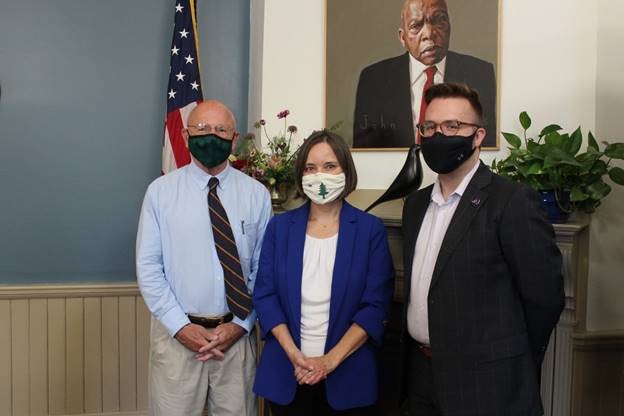FOR IMMEDIATE RELEASE
Jenna Howard [Speaker Fecteau]
jenna.howard@legislature.maine.gov
207-214-3185
Emily Cook [Secretary Bellows]
emily.cook@maine.gov
207-441-0405
Fecteau, Bellows, Brennan call on the federal government to act now on essential voting rights protections

Rep. Brennan, Secretary Bellows, and Speaker Fecteau in her office beneath a portrait of the late voting rights activist and Congressman, John Lewis
Every American deserves same good voting access that Mainers have
AUGUSTA -- Maine House Speaker Ryan Fecteau, Secretary of State Shenna Bellows, and Representative Michael Brennan called on the federal government to take action to protect all Americans’ freedom to vote by passing essential legislation including the For the People Act, the John Lewis Voting Rights Advancement Act, and the reconciliation bill which includes election infrastructure funding.
“Maine’s election laws provide the foundation for our accessible and secure elections with high rates of voter participation,” said Secretary Bellows. “I’m proud of this, but sadly right now our success stands in stark contrast to the regressive laws being passed in other states. We need action from the federal government to ensure the constitutional right to vote for every American.”
Secretary Bellows is Maine’s 50th, and first female, Secretary of State.
In 2021 Maine advanced voting rights by passing laws to enact online voter registration so that Maine citizens can register to vote from the comfort of their home or on a mobile device and ongoing absentee ballot status to allow seniors and people with disabilities to sign up for absentee ballots to be automatically mailed to them for every election. Maine also reinforced the importance of student voting by allowing Maine student IDs to be used as proof of identification in the voter registration process. Additional new laws include strengthening voter list maintenance efforts and codifying process improvements implemented mid-pandemic which ease workflows for our hardworking municipal clerks in busy election seasons.
“Voting access is the civil rights issue of our time. Mainers are proud of the secure, fair elections we hold and the access our voters enjoy. We believe that all Americans deserve equal access to the polls. That’s what our country has the opportunity to provide now,” said Speaker Fecteau. “Maine has guarded the sacred right to vote. Unfortunately, across this country barriers are being erected that limit the freedom to vote. To meet this moment, it is time for our federal elected officials to pass the For the People Act.”
Speaker Fecteau, D-Biddeford, is the youngest Speaker in America and the first openly gay Speaker in Maine’s history.
Maine is already a leader in democracy and in ensuring that all citizens have the freedom to vote. Maine’s electoral system reflects many of the values expressed in the For the People Act, but there is more to be done to ensure that all across our country that our elections are modern, accessible, and fair. This federal legislation would bring policies that have already benefited Maine voters, such as same-day voter registration, a clean election system, ballot drop boxes, automatic voter registration and no-excuse absentee voting, to other states. Secretary Bellows outlined the policies in the For the People Act which align with Maine election law in her testimony before the House Committee on Administration in February.
“When I was mayor of Portland, I didn’t always like the people in Augusta telling us what to do. When I served in the Legislature, at times I didn’t like the federal government telling us what to do,” said Rep. Brennan, “But on the matter of voting, our country must provide all Americans with uniform national standards, to ensure everyone has equal access to voting.”
Rep. Brennan, D-Portland, is a member of Maine’s bipartisan Redistricting Commission.
In addition to the For the People Act, the John Lewis Voting Rights Advancement Act restores the full protections of the original, bipartisan Voting Rights Act of 1965, which were gutted by the Supreme Court in 2013. The infrastructure reconciliation bill currently being negotiated in the U.S. Senate may include essential funding for elections infrastructure, which keeps voting and registering to vote accessible and secure.
